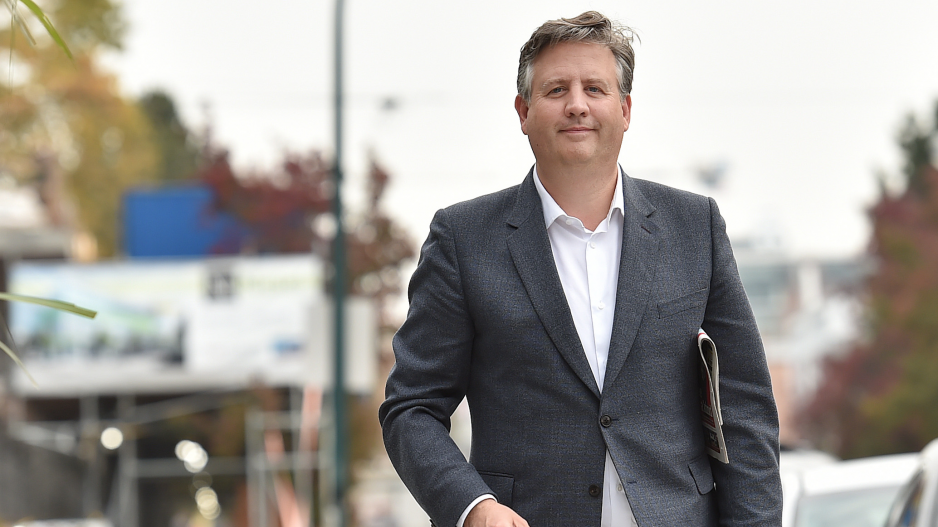Kennedy Stewart has made it clear that housing is Priority 1 on his agenda when he is sworn in as Vancouver’s first independent mayor in more than 30 years on November 5.
“That’s the overwhelming message from the electorate,” said Stewart, who campaigned on building 85,000 units of non-profit, rental and market housing over the next decade.
He has also championed tripling Vancouver’s empty-homes tax and protecting one-third to half of city homes from foreign speculation – policies he acknowledges will likely require heavier discussions with council, to which a mix of Non-Partisan Association , Green, Coalition of Progressive Electors and OneCity councillors have been elected.
“I would really like to get away from the housing crisis as fast as we can, and get on to the growth side of things,” said Vancouver’s mayor-elect. “That’s what I’m most looking forward to.”
Aside from a few general policy ideas – a small-business review, affordable neighbourhood commercial spaces and a new affordable startup hub – Stewart’s campaign did not issue an economic or business-centred platform during the race.
But now that the dust from a very close election is beginning to settle, details of the new mayor’s economic plans are starting to emerge.
For one, he is bullish on attracting cannabis research and development to Vancouver.
“There’s a huge pool of money that’s amassed in the companies, the stock market’s gone nuts, and they’re going to want to put it somewhere, and I want them to put it here,” Stewart said.
“Other cities seem to be very reluctant to do that, which I see … as a huge advantage for us.”
Stewart anticipates the industry will ask for tax cuts, but he also says the city will be open to adjusting local bylaws and can serve as a partner by helping companies navigate provincial and federal regulatory systems.
He also plans to give Vancouver’s 19 existing dispensaries priority for licence renewal because he says they have been playing by the rules.
“That should be rewarded.”
Stewart added that the province’s licensing requirements have helped provide direction at the city level. “We’ll see what happens with the other ones.”
Tax cuts are of course high priorities not only for companies looking to relocate and invest in Vancouver. The Greater Vancouver Board of Trade’s Scorecard 2018 shows that the region ranks last on a measure of tax competitiveness among the 17 jurisdictions evaluated in the Conference Board of Canada’s research. In Vancouver, commercial property taxes are nearly five times the tax rate of residential properties, and that has hurt both small and large businesses.
Stewart has committed to review the city’s permitting and taxation processes, and while he has said that no strategy or policy is off the table, he maintains a review will be the starting point for any further discussion.
However, Stewart wants any kind of cuts to be revenue neutral, “rather than us having to take a huge cut and worse … passing on more costs to the residential folks that are already being hit hard.”
He also said mayoral campaign rival Hector Bremner’s idea to offer split assessments on commercial properties should be looked at.
“It really bothers me that you can operate a business for 30 years in one location and they rezone your area or a development permit gets approved, the building won’t be built for five years, but your commercial property taxes go through the roof, and because of the triple-net lease, you’re responsible for them.”
As with the cannabis industry, Stewart is willing to get creative in how the city can support industry. As an example, he suggested integrating film and television power supply needs into the city’s urban plan.
He’s ready to listen to business, but he wants to formalize how city hall does that.
This includes a lobbyist registry to bring structure to what he sees as having been a “laissez-faire” process.
“People hate politicians, right?” he said with a chuckle.
“All the business should be right out there for the public to see.”
Just as Stewart will be leading a divided council in Vancouver, so too will he be representing the region’s biggest city at Metro Vancouver and on TransLink’s Mayors’ Council. The membership of both will be far different as a result of this month’s municipal elections.
“It’s my job to help facilitate what’s going on in the region,” said Stewart, who added that he supports the idea of a regional economic development board, but that the decision to create one rests with the province.
He also supports Surrey mayor-elect Doug McCallum’s vision to swap the city’s light-rail transit (LRT) plans for SkyTrain.
“I’ll do everything I can to help them make that happen,” said Stewart, who will also be looking to secure funding to extend the Broadway corridor subway line out to the University of British Columbia.
That will likely take support from provincial and federal governments, and Vancouver’s new mayor is prepared to visit Victoria and Ottawa to engage with elected officials on a number of issues. One he will be following closely is the outcome of B.C.’s electoral reform referendum, and the kind of support proportional representation receives in Vancouver. In 2022, Stewart doesn’t want an at-large municipal election.
“It’s universally seen as the worst electoral system, so we either have to move to proportional representation or neighbourhood constituencies,” he said.
Beyond travel to B.C.’s and Canada’s capitals, international trips and trade missions are off the table.
“I’m not a junket guy,” said Stewart, who added that he took one such trip abroad during his seven years as a member of Parliament, but paid for it himself.
“My job’s here in the city. I just gotta get this housing thing going.” •




